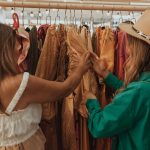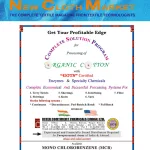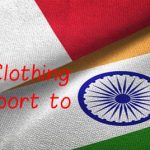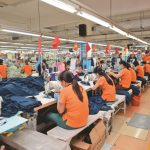How the manufacturing of medical protective gear is challenging U.S.-based textile businesses—and throwing them a lifeline. by Debra Cobb
The COVID-19 pandemic made it abundantly clear that the U.S. is unprepared to supply its health-care and frontline workers, as well as its general population, with the personal protective equipment (PPE) needed in such an emergency.
China dominates the manufacture of PPE and the raw textile materials these products require, including nonwovens. With the U.S.’s stockpile of PPE depleted by the 2009 H1N1 flu pandemic, federal agencies such as the Federal Emergency Management Agency (FEMA) and the Department of Health and Human Services (HHS), along with state and local governments, health-care organizations, hospitals, nursing homes and frontline responders scrambled in early 2020 to source PPE.
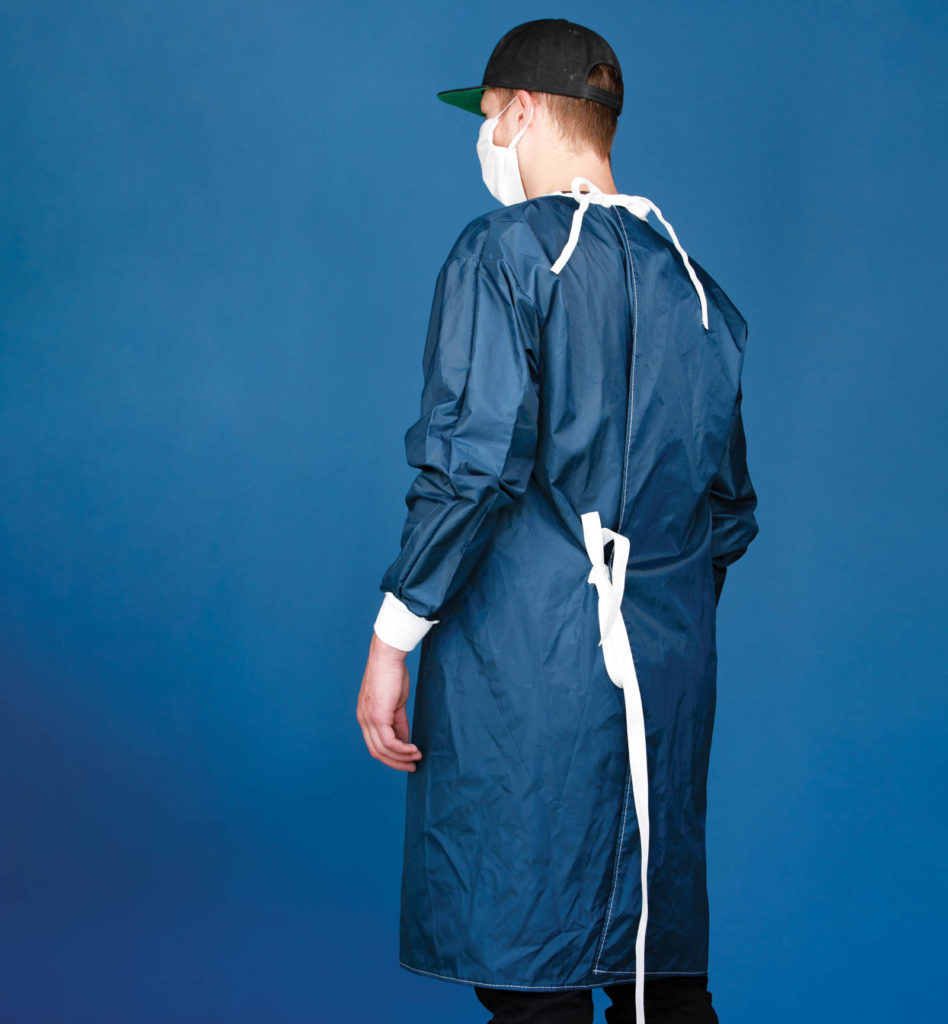
For the U.S. textile industry, it was an opportunity for reinvention. Textile businesses of all kinds have been hit hard—forced to shut down, furlough employees and rethink their operations. A realignment of U.S. textile manufacturing has begun to take shape, thanks to the efforts of textile organizations including Industrial Fabrics Association International (IFAI), the National Council of Textile Organizations (NCTO), American Apparel and Footwear Association (AAFA), SEAMS (the association and voice of the U.S. sewn products industry), Sewn Products Equipment & Suppliers of the Americas (SPESA) and the Association of the Nonwoven Fabrics Industry (INDA).
Sourcing information
As the PPE shortage escalated, textile companies were reclassified as “essential” and reopened to make PPE, rehiring furloughed employees and hiring additional sewers. And while it was not unexpected that apparel brands and manufacturers would shift their production to PPE, industrial textile companies also pivoted their production into making and delivering protective masks and hospital gowns.
“It’s the first time in my life the country is depending on textiles and cut-and-sew—one of the last bastions of old-school manufacturing,” says Adam Lava, co-owner of Chicago, Ill.-based A. Lava & Son Co., a fourth-generation contract sewer and manufacturer of bedding and mattress-making components.
But it was not an easy pivot. With little direction from government agencies, PPE patterns and material specifications were all over the place. Few makers knew the difference between medical/surgical PPE and the “community” masks being mandated for the general population. Some lacked essential equipment; many needed to train employees and new hires.

Online PPE resource centers made available by IFAI, AAFA, SEAMS and others offered suggestions for patterns, specs, materials sourcing and cut-and-sew operations. Gerber Technology, a Tolland, Conn.-based supplier of software, automation systems and services for apparel and industrial manufacturing, put together a Gerber PPE Task Force and Resource Team to assist customers and partners in making the transition.
“Manufacturing PPE requires a particular configuration of equipment and software,” says Leonard Marano, vice president for automation systems at Gerber. “We had a little bit of a head start, as we have many customers in China. Once the virus started to spread, we knew we had to gear up.”
Gerber’s PPE COVID-19 Resource Page comprises resources for patterns, tech packs and instructional videos, along with contacts for fellow suppliers and manufacturers, partner organizations and industry consultants. Since its launch on March 24, more than 1,500 companies have accessed the Gerber site for help in converting their manufacturing to make PPE, according to Marano.
Companies do not need to be Gerber customers to use the site. “We are just trying to do our part,” he says.
Gerber has additionally empowered manufacturers with its PPE Retooling Package, which includes an end-to-end suite of software, consulting and a specially configured PPE Edition Gerber Paragon® cutter, allowing manufacturers to produce up to 150,000 medical gowns and 6 million nonmedical masks per week.

Creating a PPE supply chain
The COVID-19 pandemic created an urgent need for the domestic manufacture of millions of masks and gowns, but the vertical supply chain model, from raw materials to production to customer, no longer exists within the U.S.
“If the government is sincere about reconstituting a U.S. production chain for medical personal protective equipment to resolve the drastic shortages we are experiencing during the current pandemic, it is going to have to make key policy changes to help incentivize domestic production,” says Kim Glas, NCTO president and CEO.
Working through NCTO’s connections with the federal government, a group of textile and apparel companies coalesced, creating a vertical supply chain to facilitate the quick and efficient manufacture of protective products for HHS.
Comprised of yarn spinner Parkdale Inc., apparel brands Hanesbrands Inc. and Fruit of the Loom Inc., equipment suppliers, and a group of textile and apparel makers, the coalition expected to deliver more than 320 million washable three-ply cotton masks, made in the U.S. and Central America, at the rate of 10 million per week.

Treated with an antimicrobial fabric finish, the masks are not medical grade but are approved by HHS for use by the general public, freeing up higher-grade masks and respirators for medical and frontline workers.
Lava & Son became a part of this coalition through Beverly Knits Inc., one of Lava’s suppliers and a member of the coalition. With 350 employees and 400,000 square feet in Chicago, and another 80,000 square feet in Haiti (jointly owned with Culp Home Fashions), Lava churns out thousands of masks per week.
The company donated 5,000 masks to the Chicago Police Department and sells directly to consumers and local organizations through its website, Naturally Nestled.
“We’re trying to do our part, selling to the U.S. government, but we also want to help our local community,” Lava says. “Everyone is pitching in. Retirees are whipping out their sewing machines.”
According to Lava, the company’s next step is the development of digitally printed polyester/spandex masks in partnership with Springs Creative Products Group LLC. The antiviral, antibacterial, water-repellent masks will feature designs and logos, making them ideal for medical and dental offices, restaurants and other businesses.

Keeping it local
Relying on local connections and word of mouth, smaller manufacturers are also staying alive by pivoting to make PPE. At American Awning & Blind Co., North Hollywood, Calif., the 110-year-old maker had shut down a few days before California’s major healthcare organization, Kaiser Permanente®, put out a call for community masks.
With a client list including hospitals, restaurants, builders and Hollywood studios, president Ethan Halpern decided to market customized PPE masks to local businesses. Calling back his team of 10 employees, he added additional sewing machines and doubled the number of sewers, now capable of producing “a couple thousand masks per week,” Halpern says.
The washable masks are made of two layers of woven cotton with a pocket for a disposable nonwoven filter. “Our sewers just jumped into it,” Halpern says. “They had been making masks at home and came up with the pattern. The design is not the quickest to produce, but we wanted to do the best job.”
As the company does not have automated cutting equipment, the masks are cut by hand. “It’s definitely a learning curve,” Halpern says. “We need to streamline the process in order to scale up production.”
The company has sold a few hundred masks on its website. Halpern hopes that the masks may be an entryway to other projects and government opportunities and is looking into future potential for vinyl enclosures and drop screens to protect outdoor customers from contamination.

Tropical J’s Inc., which supplies shade and outdoor products to Honolulu, Hawaii’s commercial and residential markets, also shut down following the state’s work-from-home order. According to Jordan Barnes, designer and operations manager for the family-owned company, Hawaii’s isolated location makes sourcing PPE particularly challenging. A friend with connections to the state’s emergency procurement operations told him, “If you can start making masks, I can get you back to work.”
Barnes and his wife began designing and sewing masks at home and giving them away. Barnes’s father, company owner Gary Barnes, recommended they add an inside layer of Block-It® Matrix, a breathable, water-resistant polypropylene nonwoven fabric.
Barnes cited IFAI’s COVID-19 Resource Center as a helpful source of information. “IFAI has been on top of it, pulling people together, discussing materials and sharing patterns,” he says.
Gary Barnes sent a sample of the mask to the state department of health, which responded with a contract for 2,000 community masks. As a result, Tropical J’s reopened, calling back its 30 employees. Several revisions to the original design rendered operations quicker and more efficient. The company also offered the use of its in-house cutting machine to local home sewers making PPE.
“Word spread quickly, and soon sailmakers and other upholsterers were dropping off rolls of fabric to be cut—many times over what we could ever manufacture ourselves,” he says.
The company has since filled the state’s order, with more in the pipeline, including another 500 masks that were made for a local contractor’s construction crew. “People are slowly starting to get back to work, and I’m now seeing some of the masks we’ve made out in public,” Barnes says. “It’s a great feeling to belong to one of the many local companies that rose to the occasion during this pandemic.”
Making the most of social media
Justin Jones, owner at SewLong Custom Covers, a marine fabricator in Salt Lake City, Utah, credited social media with the company’s introduction to PPE. “We were inspired by our colleagues on Facebook,” Jones says. “One of our customers reached out, looking for isolation gowns.”
With a staff of 10 to 20 employees and home sewers, SewLong makes custom covers and upholstery for boats, RVs, specialty vehicles and outdoor furniture. According to Jones, the company pivoted to making PPE in fear of not having its regular business. “Now, regular business is coming back with a fury,” he adds.

To keep up with demand, SewLong partnered with sister company Jack’s Do It Shop & Upholstery, added five sewing machines and fired up an old unused bartacker. So far, the company has made more than 3,000 washable 200-denier nylon and polyester gowns, polyurethane coated for water repellency.
The gown specifications were worked out with colleagues in the industry. “Everyone is sharing,” Jones says. “Marine fabricators are very open.”
In addition to gowns, SewLong has made more than 5,000 medical/surgical masks using polypropylene spunbond nonwoven fabric. The pleated design can also be worn over a respirator for additional coverage.
Half the those masks were donated to the Navajo Nation, which led the U.S. in COVID-19 cases per capita, and various other local health-care and business entities. All of SewLong’s PPE sales have come through Facebook, and the company has committed to continue to donate a minimum of 20 percent of the face masks it manufactures.
The company looks at its PPE business as a way to “help with the demand and provide hope and work for our team,” rather than a profit center. “We will go forward as long as there is demand,” Jones says.
Debra Cobb is a freelance writer with extensive experience in the textile industry. She is based in North Carolina.
